When a puppy becomes a full-grown dog, you don't suddenly stop making time to take it on walks, throw it a ball, or wage tug-of-war with its slobber-covered rope toy. If you did, you'd have one sad pooch.
The reason is that the need to play is baked into their DNA, and it doesn't disappear when they're adults. The same is true for all mammals, including us humans. And ever more research shows that no matter how old we are, not allowing time for play can have negative effects on our mental and physical health.
Our mission here at UDisc is to empower the world to play more disc golf. Simplify that a bit, and you have a mission to help the world "play more." So we naturally have an interest in learning how our work can help others lead happier lives.
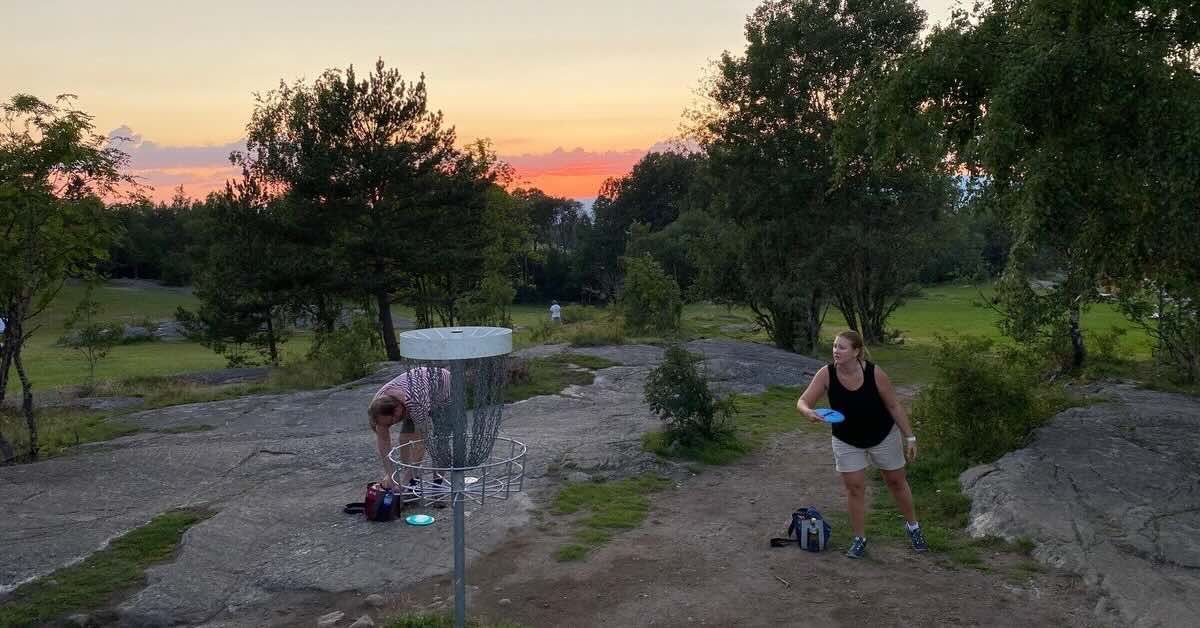
That's why we recently spoke with two people to get a deeper understanding of why play is so important for wellbeing and what aspects of disc golf make it a valuable and appealing way to include it in adult lives.
One is Kirsti Pederson Gurholt, Professor Emerita at the Norwegian School of Sport Sciences.
Gurholt has published numerous articles about outdoor recreation and education, play, and public health. At 71-years-old, Gurholt isn't a disc golfer, but she definitely practices what she preaches as she enjoys kayaking, hiking, biking, playing with her grandchildren, and even practicing gymnastics alongside lifelong friends and her – yes – 100-year-old coach.
The other is Andi Seawright, a professional in social work who founded an organization, Queer Disc Golf, that sees playing disc golf as a powerful way to help the LGBTQ+ community combat high rates of mental health struggles and loneliness. The organization's mission is to break down the barriers that often exist in sports, ensuring that everyone feels welcomed and valued, regardless of their gender identity or sexual orientation.
Play Improves Health & Connection
Gurholt's active and playful lifestyle is almost certainly a big reason why she as a septuagenarian – as well as others of similar ages in her gymnastics group – continues to live a vibrant and healthy life.
"Play improves mental health and also cognitive health," said Gurholt. "It keeps your brain very active and you have to reorganize yourself and relate to others when you play a game that is also social."
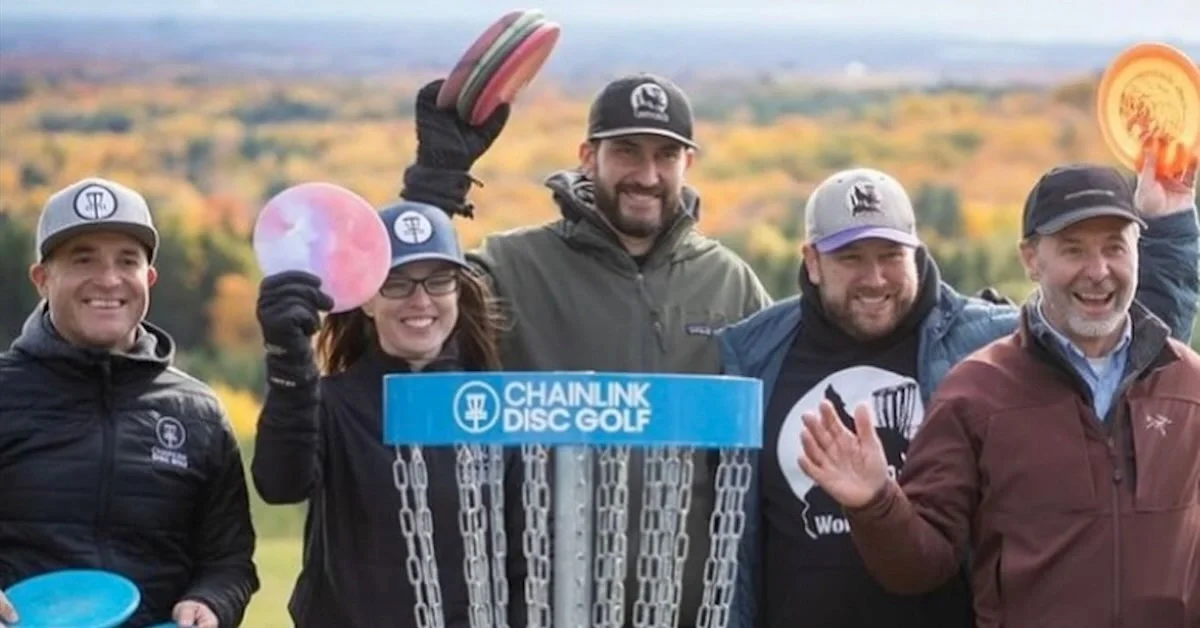
Games have been shown to enhance cognitive health by encouraging participants to practice problem solving and strategic thinking. Learning new games or activities challenges our brains to adapt and form new neural pathways.
When games include physical activity, they're not only good for our physical health and fitness but can reduce stress and anxiety, improve mood, and strengthen essential cognitive skills like memory and focus.
These benefits also mean that allowing ourselves playtime can help us be more present and available for our friends and family as well as more focused and motivated at our jobs. So though it may feel necessary or virtuous to kick play out of your schedule in favor of work and family obligations, doing so likely lowers the potential quality of your work and family time.
"Play is something you don't necessarily have to do in your ordinary life, but I think everyone should take time to do it," said Gurholt. "When we play we are free from distractions and obligations. You're present with those around you. You share what happens and can talk about it later. Play builds community and spreads joy."
The act of being in the present moment that Gurholt refers to is also referred to as mindfulness or grounding. It's something Seawright frequently introduces and practices with those they're supporting in their social work.
"We talk a lot about grounding, and often bringing people into the present moment is something that we really try to support them with," said Seawright. "Things like disc golf kind of naturally do that. You have to do things that are really intentional. You are constantly making strategic decisions. That in and of itself has a lot of value. There is something that is so fulfilling about slowing down and existing in the present moment."
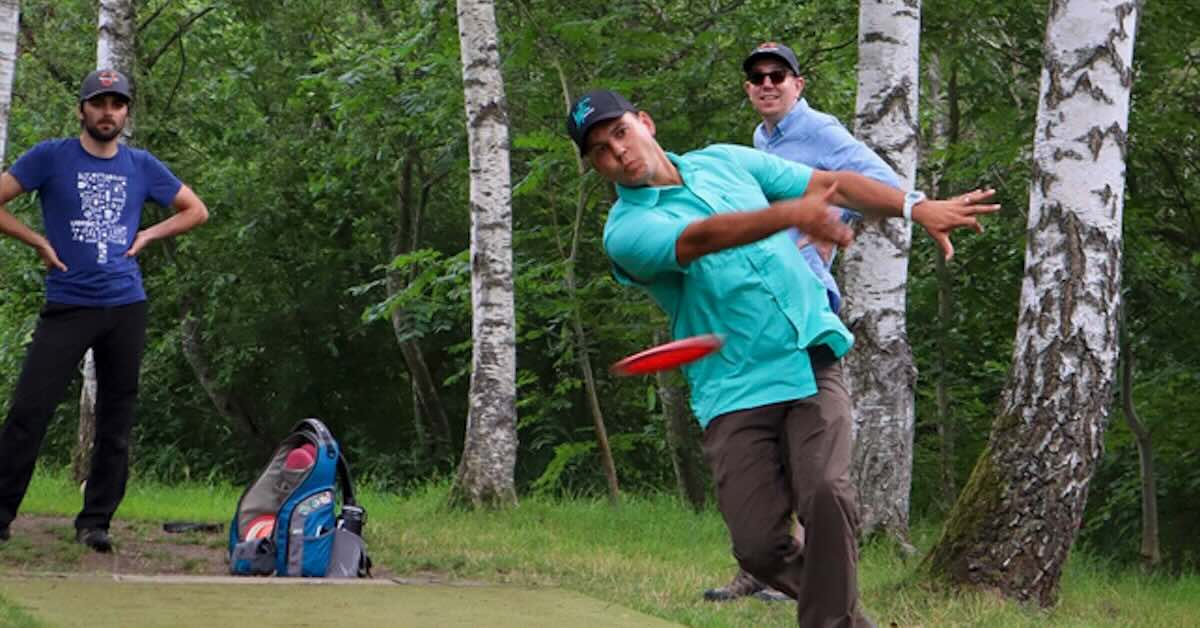
Seawright has also found that sharing these grounding moments during play with a group helps people connect with each other in a deeper and more natural way than they might in more formal or structured settings. This idea is, in fact, the backbone of many play-based team building activities, which employees of companies like Netflix have experienced in the form of disc golf.
"I've been more excited for other people's aces or great shots than my own," said Seawright. "You feel like you've accomplished it together even though you didn't throw the shot. There's something about that shared experience that helps create bonds and is so hard to find."
Disc Golf Is Play For All Ages & Skill Levels
There are two big reasons disc golf as a form of play is so likely to create the "shared experiences" Seawright mentioned: how and where it's played.
Unlike most sports (or, for that matter, board games), disc golf does not involve an adversarial relationship with a direct opponent who actively tries to prevent you from accomplishing your goals and strategies. No one boxes you out of the prime spot on the tee or stands in front of the basket ready to swat down your putt. There's just you and the course.
This makes it a game that's easier to play in groups where age, athleticism, and/or experience vary widely – and also a game that allows you to be genuine while at play. Unlike how you might play below your true abilities to avoid demotivating and boring a weaker opponent in many games, playing your best disc golf is far less likely to hurt anyone's feelings.
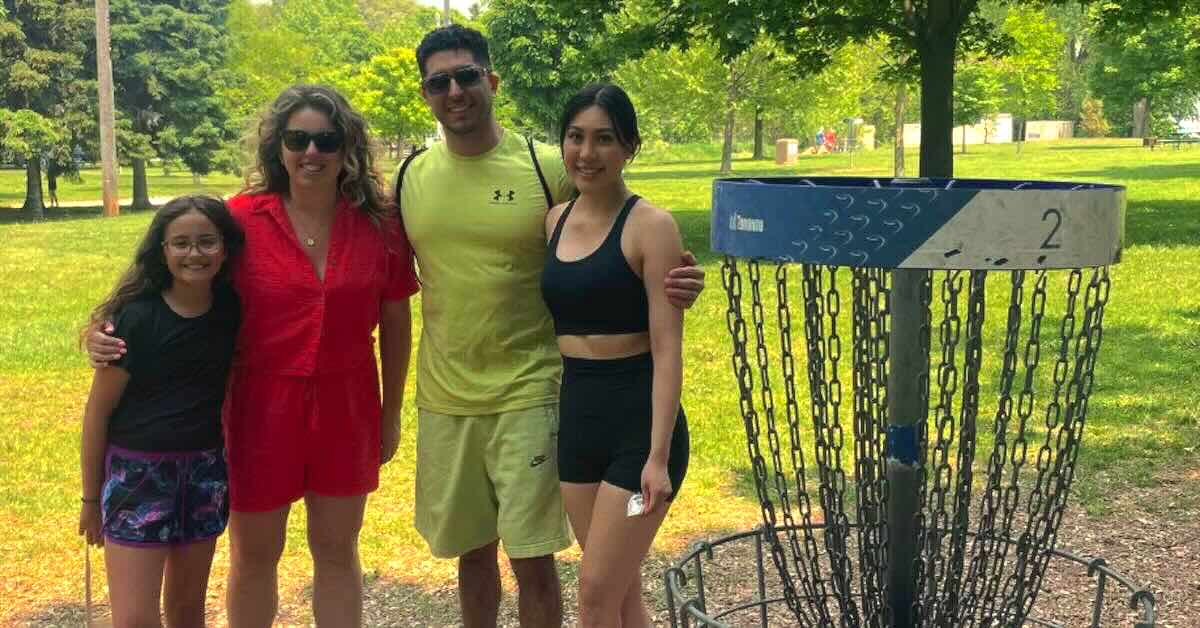
Along with the wide variety in disc golf course difficulty and length, the structure of disc golf courses adds to the game's ability to accommodate diverse player groups, too.
"If you approach a tennis court as a novice and experienced players are there, it's not really a place for you," said Gurholt. "It takes a lot of self confidence to join in. In disc golf I see that you are always moving along and then there is space for others to start playing."
To expand on Gurholt's example, in tennis novices might feel pressure to cede the entire court to better players, making it impossible for them to enjoy the game for an extended period. Disc golf courses, on the other hand, can comfortably accommodate groups of four or five simultaneously playing on each of their holes (e.g., between 36 and 45 players on a nine-hole course and double that for 18-hole courses), and slower groups can usually let faster ones play through on just a single hole before continuing their own play.
Seawright has found that this accessibility for all skill levels makes disc golf a great tool to build connection and community.
"I used to run weekly drop-in groups," said Seawright. "A lot of people would come, and, honestly, they weren't that interested in getting better at disc golf. They were interested in connecting and making friendships. Those tend to be the people who really come to our events. Some are still very good, but they prioritize connection over competition."
The relative unimportance of fellow players' capabilities also makes it easier for adults to play disc golf with kids. Gurholt has found that play has helped her to connect with her grandchildren, and many adults she has interviewed for academic research have mentioned that they experience the world in a new and meaningful way when they play with younger children.
Disc Golf Is Play That's Affordable & Close to Home
Along with being approachable for players of different ages and ability levels, disc golf is accessible financially and, in many regions of Europe, the United States, and Canada, geographically. Around 90% of courses are free to play and more than 500 million people live within six miles/10 kilometers of a course.
These are two more reasons why – though Seawright and Gurholt both agree that play of any sort is valuable – disc golf is and can be an attractive option for fun for so many.
Seawright, for example, said that the seven free-to-play disc golf courses in Toronto (many of which exist thanks to the work of the team at ChainLink Disc Golf) that are all accessible by public transport are a huge reason they recommend disc golf to those they work with in social work.
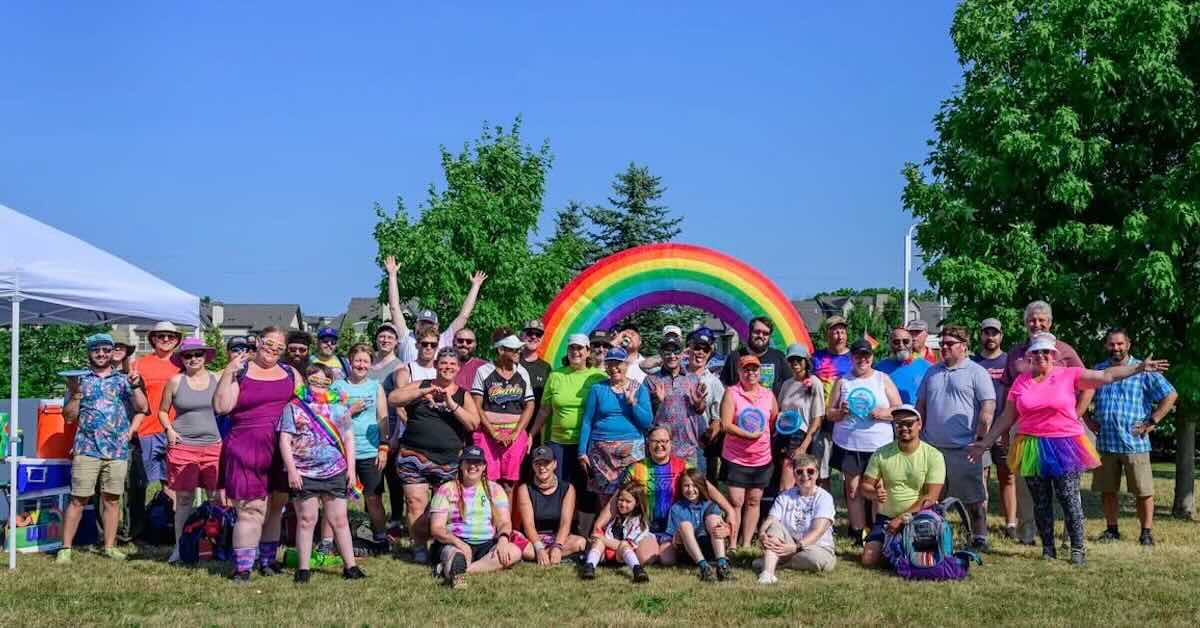
"It's hard for people to find things that are easy to get into and relatively low cost," said Seawright. "Even in a city like Toronto that provides a lot of opportunities for its citizens, affordable options can be difficult to discover. I played golf before, but then I couldn't afford it. I was frustrated, and I wanted something I could get better at. Disc golf filled that need."
Learn Where & How to Play Disc Golf
Whether you're looking to add more play into your or others' lives due its positive effects on mental and physical health, its ability to decrease loneliness, or the community and connections it can help build, disc golf may be exactly what you're looking for.
"One message that I would like to put across is that you can always start playing at any time in your life and you should never stop," said Gurholt. "It's hard to say one activity is better than another so try things out and find out what you enjoy. Disc golf is easy to try because you don't need lots of equipment, you can play it with your grandchildren, and it's open and affordable. Start easy. You want your activity to be challenging but not too hard."
If you are interested in giving disc golf a shot, here are free resources to make it simpler:
- Where can I find a disc golf course?
Use the UDisc Courses directory to find disc golf courses across the world. This is the largest and most-frequently updated disc golf course directory in existence. Try out the UDisc disc golf course directory on the web or in the UDisc app available in the Google Play and Apple App stores.
For your first time playing, we recommend looking for courses with at least one layout rated as Easy and Short (or Very Short) with a rating around 4.0 or higher. - Where can I get discs?
Along with disc golf courses, UDisc has a directory of disc golf stores. If none happen to be near you, discs are easy to find online. We even have a guide to sites that sell used disc golf discs (typically cheaper than new ones) in the U.S. and Europe. If you get overwhelmed by the choices online, our looks at players' favorite disc golf disc brands and what disc golf flight numbers mean will hopefully help.
If you're lucky, you may have a disc golf club or even a library that loans out disc golf discs for free in your area. - How do I find people to play with?
Use UDisc Events to search for disc golf meet-ups in your area. We suggest adding a filter for "Beginner-Friendly" when you search.
For more information, give our guide to playing your first round of disc golf a read.
